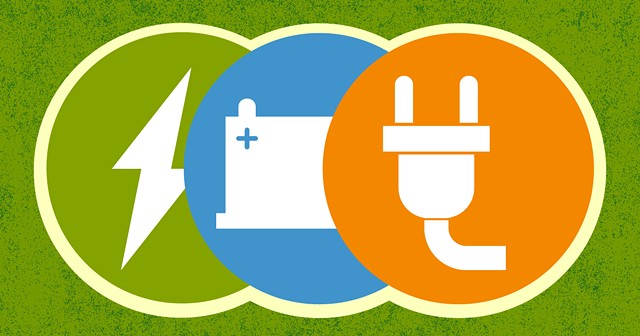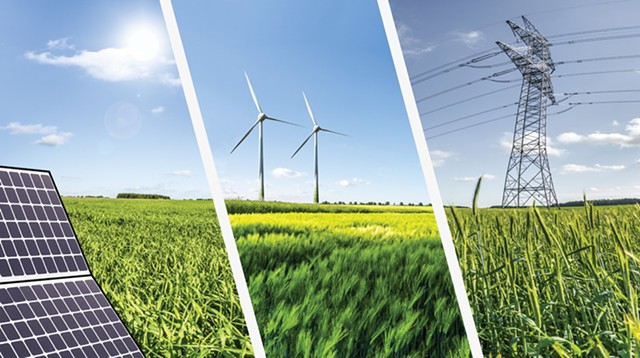[
{
"name": "500x250 Ad",
"insertPoint": "5",
"component": "15667920",
"parentWrapperClass": "",
"requiredCountToDisplay": "1"
}
]
Rochester Gas & Electric and its sister company, New York State Electric & Gas, would cease expanding their natural gas infrastructure, stop promoting the use of the fuel, and wean customers off of natural gas, under a proposed settlement with state regulators.
The settlement, which stems from a three-year rate plan for the utilities’ energy and natural gas deliveries and is expected to be approved by the Public Service Commission in September, is considered a victory for environmental groups that had been pushing to scale back the use of natural gas, which contributes to climate change.
If the settlement is approved, customers will see their electric and natural gas bills rise beginning in October and through the next three years.
For customers of RG&E, which serves the bulk of Monroe County, the electricity delivery rate will increase by 2.4 percent in the first year and 5.2 percent in each of the second and third year. The average household would see its monthly electric bills grow by 37 cents in the first year, $3.82 in the second year, and $4.14 in the third, according to the utility.
RG&E’s natural gas delivery rate won’t go up in the first year but will rise less than 1 percent in the second year and 1.3 percent in the third year. For average gas heating customers, the second year rate increase will add 20 cents per month to their bills, while the third year rate increase will add .83 cents per month, according to the utility.
The rate increases are necessary, the utilities argue, for supporting infrastructure. Both systems are aging and are facing increasingly harsher wind, rain, and snow storms.
“Obviously the climate is changing and with that comes unexpected weather patterns,” said Mike Jamison, a spokesperson for the utilities’ parent company, Avangrid. “When you mix that with an aging infrastructure that requires investment — we have to invest in our system to ensure we have the resources to best serve our customers.”
The revenue from the rate increases would be used in part for vegetation management and infrastructure improvements.
Rate cases are incredibly complex proceedings in which the Public Service Commission seeks to balance the demands of residential, commercial, community, and environmental interests with the utilities investment needs and profit desires. The settlement in question was 825 pages.
Environmental and climate groups across New York have been pushing for state officials to stop allowing new natural gas infrastructure and for utility companies to transition off of natural gas, the extraction, distribution, and consumption of which contributes to climate change. When burned, natural gas produces the greenhouse gas carbon dioxide as a byproduct. Methane, the chief component of natural gas, is itself a greenhouse gas and substantial amounts of it leak into the atmosphere at well sites, through pipelines, and through utilities’ natural gas systems.
Several of the groups, including Rochester People’s Climate Coalition, were intervenors in the rate case, and they’re supporting the natural gas portion of the settlement. The Rochester People’s Climate Coalition opposes the electricity rate increase, said Kristen Van Hooreweghe, who represented the organization in the rate cases.
“What we feel we were able to accomplish was move the needle, so to speak, on getting the companies away from unabashed growth in gas planning and investment and more toward planning and investment in a future that lines up with” state emissions and renewable energy goals established by lawmakers last year, Van Hooreweghe said.
Under the proposed settlement, NYSEG would cancel one proposed pipeline in Tompkins County as well as proposals to replace or expand an existing pipeline that runs between Chenango and Otsego counties. Both RG&E and NYSEG would make investments to encourage beneficial electrification — that is, replacing things that consumed natural gas or other fossil fuels with super-efficient electric alternatives.
For example, RG&E and NYSEG are each committing $750,000 for grants to help low- to moderate-income households switch from natural gas furnaces to electric heat pumps, which use electricity to more efficiently heat and cool residences. Recipients could use the grants in addition to any state or federal incentives or rebates.
The Rochester People’s Climate Coalition partners with the city of Rochester and PathStone on an initiative encouraging city homeowners to replace outdated natural gas furnaces with heat pumps.
“We think we’re going to be able to do a lot of good with that money,” Van Hooreweghe.
Under the natural gas portion of the settlement, the utilities will prepare reports examining how their businesses might evolve in coming years in response to climate change and identifying how they’ll reduce natural gas usage. They’ll also produce a study on the feasibility of establishing geothermal district energy systems in their respective service areas.
Under the electric rate case settlement, both utility companies would establish a program to remove trees that pose a danger to power lines or other infrastructure.
The utilities would also preserve their arrears forgiveness programs; provide a one-time $100 bill credit to households and small commercial customers who have experienced “negative economic impacts” from the COVID-19 pandemic; suspend residential service terminations during heat advisories; add electric vehicles, including bucket trucks, to their fleets; and delay the installation of smart metering systems they’d planned for 2021 until 2022.
In light of the pandemic, the utilities temporarily suspended electric and gas shutoffs for nonpayment, though state lawmakers later approved a moratorium on shut-offs. But Metro Justice, a Rochester activist organization, has criticized RG&E for continuing to send automated shut-off notices, which it has said needlessly alarms people already facing hardship.
The state Public Service Commission is accepting public comments on the settlement proposal through July 23. Comments can be submitted at www.dps.ny.gov (links to the RG&E and NYSEG rate cases are on the home page), by e-mailing [email protected], or by calling the commission’s toll-free opinion line at (800) 335-2120.
Comments can also be mailed to New York State Public Service Commission, Three Empire State Plaza, Albany, NY 12223-1350.
The settlement, which stems from a three-year rate plan for the utilities’ energy and natural gas deliveries and is expected to be approved by the Public Service Commission in September, is considered a victory for environmental groups that had been pushing to scale back the use of natural gas, which contributes to climate change.
If the settlement is approved, customers will see their electric and natural gas bills rise beginning in October and through the next three years.
For customers of RG&E, which serves the bulk of Monroe County, the electricity delivery rate will increase by 2.4 percent in the first year and 5.2 percent in each of the second and third year. The average household would see its monthly electric bills grow by 37 cents in the first year, $3.82 in the second year, and $4.14 in the third, according to the utility.
RG&E’s natural gas delivery rate won’t go up in the first year but will rise less than 1 percent in the second year and 1.3 percent in the third year. For average gas heating customers, the second year rate increase will add 20 cents per month to their bills, while the third year rate increase will add .83 cents per month, according to the utility.
The rate increases are necessary, the utilities argue, for supporting infrastructure. Both systems are aging and are facing increasingly harsher wind, rain, and snow storms.
“Obviously the climate is changing and with that comes unexpected weather patterns,” said Mike Jamison, a spokesperson for the utilities’ parent company, Avangrid. “When you mix that with an aging infrastructure that requires investment — we have to invest in our system to ensure we have the resources to best serve our customers.”
The revenue from the rate increases would be used in part for vegetation management and infrastructure improvements.
Rate cases are incredibly complex proceedings in which the Public Service Commission seeks to balance the demands of residential, commercial, community, and environmental interests with the utilities investment needs and profit desires. The settlement in question was 825 pages.
Environmental and climate groups across New York have been pushing for state officials to stop allowing new natural gas infrastructure and for utility companies to transition off of natural gas, the extraction, distribution, and consumption of which contributes to climate change. When burned, natural gas produces the greenhouse gas carbon dioxide as a byproduct. Methane, the chief component of natural gas, is itself a greenhouse gas and substantial amounts of it leak into the atmosphere at well sites, through pipelines, and through utilities’ natural gas systems.
Several of the groups, including Rochester People’s Climate Coalition, were intervenors in the rate case, and they’re supporting the natural gas portion of the settlement. The Rochester People’s Climate Coalition opposes the electricity rate increase, said Kristen Van Hooreweghe, who represented the organization in the rate cases.
“What we feel we were able to accomplish was move the needle, so to speak, on getting the companies away from unabashed growth in gas planning and investment and more toward planning and investment in a future that lines up with” state emissions and renewable energy goals established by lawmakers last year, Van Hooreweghe said.
Under the proposed settlement, NYSEG would cancel one proposed pipeline in Tompkins County as well as proposals to replace or expand an existing pipeline that runs between Chenango and Otsego counties. Both RG&E and NYSEG would make investments to encourage beneficial electrification — that is, replacing things that consumed natural gas or other fossil fuels with super-efficient electric alternatives.
For example, RG&E and NYSEG are each committing $750,000 for grants to help low- to moderate-income households switch from natural gas furnaces to electric heat pumps, which use electricity to more efficiently heat and cool residences. Recipients could use the grants in addition to any state or federal incentives or rebates.
The Rochester People’s Climate Coalition partners with the city of Rochester and PathStone on an initiative encouraging city homeowners to replace outdated natural gas furnaces with heat pumps.
“We think we’re going to be able to do a lot of good with that money,” Van Hooreweghe.
Under the natural gas portion of the settlement, the utilities will prepare reports examining how their businesses might evolve in coming years in response to climate change and identifying how they’ll reduce natural gas usage. They’ll also produce a study on the feasibility of establishing geothermal district energy systems in their respective service areas.
Under the electric rate case settlement, both utility companies would establish a program to remove trees that pose a danger to power lines or other infrastructure.
The utilities would also preserve their arrears forgiveness programs; provide a one-time $100 bill credit to households and small commercial customers who have experienced “negative economic impacts” from the COVID-19 pandemic; suspend residential service terminations during heat advisories; add electric vehicles, including bucket trucks, to their fleets; and delay the installation of smart metering systems they’d planned for 2021 until 2022.
In light of the pandemic, the utilities temporarily suspended electric and gas shutoffs for nonpayment, though state lawmakers later approved a moratorium on shut-offs. But Metro Justice, a Rochester activist organization, has criticized RG&E for continuing to send automated shut-off notices, which it has said needlessly alarms people already facing hardship.
The state Public Service Commission is accepting public comments on the settlement proposal through July 23. Comments can be submitted at www.dps.ny.gov (links to the RG&E and NYSEG rate cases are on the home page), by e-mailing [email protected], or by calling the commission’s toll-free opinion line at (800) 335-2120.
Comments can also be mailed to New York State Public Service Commission, Three Empire State Plaza, Albany, NY 12223-1350.
Latest in News
More by Jeremy Moule
-

ROCHESTER TEN
ANNETTE RAMOSAug 1, 2023 - More »







